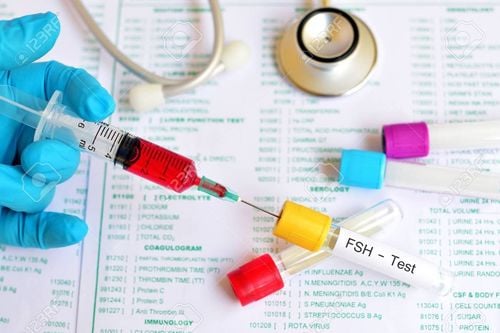This is an automatically translated article.
Polycystic ovary syndrome (PCOS) is one of the most common causes of infertility in women today. This disease can cause many complications during pregnancy of pregnant women.
1. What is Polycystic Ovarian Syndrome (PCOS)?
Polycystic ovary syndrome (PCOS) is the most common endocrine disorder in women of reproductive age. When many small cysts appear along the outer edge of each ovary. At the same time, the patient may also have endocrine-reproductive disorders.With the normal human body, in any gender, there is always a certain amount of male and female hormones in the body. However, in women with polycystic ovary syndrome (PCOS), the amount of male hormones will be higher than normal, so the function of the ovaries will be disturbed.
Patients with polycystic ovary syndrome (PCOS) are at risk for missed periods, irregular periods and even infertility. Although polycystic ovary syndrome (PCOS) cannot be completely cured, it is still treatable.
2. Symptoms of Women with Polycystic Ovarian Syndrome (PCOS)
Symptoms of polycystic ovary syndrome (PCOS) are very diverse, in which the most common and recognizable symptoms are: thinning hair, thick hair, acne, appearance of skin pigmentation.

Nổi nhiều mụn có thể là dấu hiệu của phụ nữ mắc buồng trứng đa nang
Women with polycystic ovary syndrome (PCOS) often tend to gain weight, especially when the waistline becomes larger and difficult to control. Besides that, some other symptoms are noted as pelvic pain and depression.
3. Causes of disease
Currently, researchers have not determined the exact cause of polycystic ovary syndrome (PCOS). However, there are some studies that suggest that high insulin levels may be the main cause of polycystic ovary syndrome (PCOS). Women who are overweight or gain weight are at a higher risk than normal.
In addition, there are also some other studies that show that genetic factors also play an important role in the cause of the disease. Families with sick mothers or sisters, children are more likely to get sick.
The reported cases of polycystic ovary syndrome (PCOS) are usually women between the ages of 20 and 30. However, there is also a documented case that an 11-year-old girl who has not had a period may also have polycystic ovary syndrome (PCOS).
4. How is polycystic ovary disease (PCOS) diagnosed?
During the examination, the doctor will diagnose polycystic ovary syndrome (PCOS) when the patient has at least two of the following symptoms:
Irregular or irregular menstrual periods; High levels of specific hormones; There are more than 12 follicles in each ovary. During the examination, the doctor may ask more about the patient's family history, conduct a clinical examination or order a blood test to differentiate it from other diseases, including diseases of the liver. Thyroid.

Bệnh nhân được chỉ định xét nghiệm máu để chẩn đoán chính xác tình trạng bệnh
5. Possible pregnancy complications in women with polycystic ovaries (PCOS)
Polycystic ovary syndrome (PCOS) can cause many dangerous complications for patients, even life-threatening. Of these, the following conditions are the most commonly reported complications in patients with polycystic ovary syndrome (PCOS).
5.1 Infertility Since polycystic ovary syndrome (PCOS) affects a woman's fertility, it is also a major cause of infertility. In these cases, doctors may prescribe patients with polycystic ovaries (PCOS) to use infertility drugs such as clomiphene, which will stimulate mature ovulation.
At the same time, the doctor also prescribes some other drugs with similar effects or uses in vitro fertilization.
5.2 Multiple pregnancy After treatment for infertility in women, especially those with polycystic ovary syndrome (PCOS), who have undergone treatment for infertility related to anovulation, the risk of perinatal mortality is very high. due to the occurrence of multiple pregnancies.
Most pregnancy complications of women with polycystic ovary syndrome (PCOS) are multiple pregnancies. However, not every multiple pregnancy is caused by polycystic ovary syndrome (PCOS), and other obstetric and neonatal complications can also cause this condition.
5.3 Miscarriage According to research by scientists, the rate of miscarriage in pregnant women with polycystic ovary syndrome (PCOS) will be higher than normal. Specifically, according to Australian statistics, the rate of miscarriage in women with polycystic ovary syndrome (PCOS) is 5% higher than normal. However, this type of complication is still controversial and has not been fully proven.

Hội chứng buồng trứng đa nang làm tăng nguy cơ bị sảy thai
Some other documented complications that women with polycystic ovary syndrome (PCOS) may experience are:
High blood fat, leading to cardiovascular disease, high blood pressure or heart attack; Sleep apnea ; Mental disorders: depression, bipolar disorder; Insulin resistance, metabolic syndrome, type 2 diabetes; Fat; Endometrial cancer, especially in older women with polycystic ovaries (PCOS). Polycystic ovary syndrome (PCOS) cannot be completely cured, but it can be treated and monitored to maintain a woman's health and fertility. Patients need to go to reputable medical facilities to be examined and consulted by doctors with many years of experience.
Polycystic ovary is a dangerous disease for women because it causes many serious complications. To detect this disease early, you should have regular reproductive health check-ups at reputable hospitals.
Vinmec International General Hospital is one of the high-quality medical facilities trusted by customers with a team of highly qualified, experienced, foreign-trained and dedicated medical doctors and nurses. . Modern and state-of-the-art medical equipment makes diagnosis and treatment the most effective. Vinmec always updates the world's most advanced medical techniques, providing patients with effective treatment regimens, minimizing post-treatment complications, and preventing recurrence.
Please dial HOTLINE for more information or register for an appointment HERE. Download MyVinmec app to make appointments faster and to manage your bookings easily.













